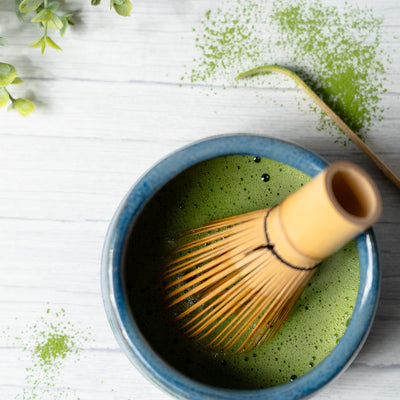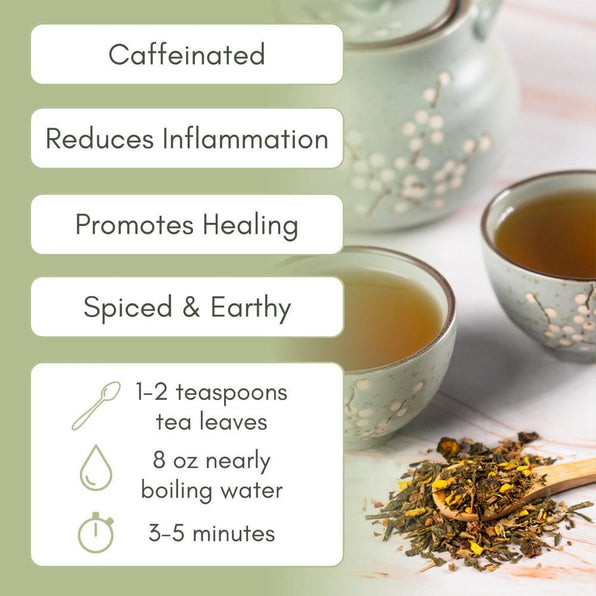Matcha has recently gained popularity in the United States due to its plentiful health benefits. Now, a new study has come out revealing the powerful effect of matcha on breast cancer cells.
First off, what is matcha?
Matcha is made from green tea leaves that have been ground down into a super fine powder. However, not just any green tea leaves can be used to make matcha. The plants must be temporarily grown in the shade. This blocking of the sun causes the plants to overproduce chlorophyll, giving them a vibrant green color and increased health benefits.
Full Leaf Tea Company's Organic Premium Matcha is a USDA certified organic matcha from the Aichi Prefecture in Japan. Matcha powder is traditionally whisked with hot water to create a soothing and potent cup green tea. However, it can also be used in smoothies, lattes, baked goods, and more. It has a smooth umami flavor.
How does matcha fight breast cancer?
Scientists at the University of Salford’s Biomedical Research Centre did a study on the effects of matcha on breast cancer stem cells. Using metabolic phenotyping, they discovered matcha pushed these cells into an inactive state, reducing the spread of these cells. According to Professor Michael Lisanti, “ [Matcha] is preventing the cells from ‘re-fuelling’ and therefore they become inactive and die.” In the context of this study, MGT refers to the specific type of matcha green tea being investigated for its anti-cancer properties, particularly its effects on cancer stem cells and cellular metabolism in cancer cells.
- Suppresses Cancer Stem Cells : Green tea, especially EGCG, suppresses the properties of cancer stem-like cells, which are crucial for the growth and spread of tumors.
- Inhibits Cancer Cell Growth : MGT was found to specifically inhibit the proliferation and expansion of cancer stem cells derived from breast cancer.
- Reduces Cellular Metabolism : MGT reduces the overall energy production in cancer cells, including mitochondrial respiration and glycolysis, which are essential processes for cancer cell survival.
- Decreases Key Enzyme Levels : MGT treatment dramatically lowers the levels of fatty acid synthase (FASN), an enzyme overexpressed in many cancers that supports tumor growth.
- Halts Cancer Cell Survival and Propagation : MGT treatment significantly reduces the ability of cancer stem cells to survive and form new cancer cells, cutting their sphere-formation capacity by 50%.
- Impairs Multiple Cell Signaling Pathways : MGT disrupts various cellular processes, including cell cycle regulation, antioxidant response, and inflammation, which are vital for cancer cell survival.
- Potential to Overcome Chemotherapy Resistance : Studies suggest that MGT may help in overcoming resistance to chemotherapy, making it a potential natural supplement in cancer treatment.
Their results infer that matcha could potentially be used to help reprogram breast cancer cells. Matcha is also known for reducing anxiety, boosting metabolism, increasing focus, and more.
Read more about the many health benefits of matcha HERE .

Check out these other Matcha Blogs!
Sources:
Bonuccelli, Gloria, et al. “Matcha Green Tea (MGT) Inhibits the Propagation of Cancer Stem Cells (CSCs), by Targeting Mitochondrial Metabolism, Glycolysis and Multiple Cell Signalling Pathways.” Aging, 2018, doi:10.18632/aging.101483.
University of Salford. “Green Tea Prevent Cancer Cells from 'Refuelling'.” Green Tea Prevent Cancer Cells from 'Refuelling' | News Portal | University of Salford, Manchester, University of Salford Manchester, 30 Aug. 2018, www.salford.ac.uk/news/articles/2018/green-tea-prevent-cancer-cells-from-refuelling.




















